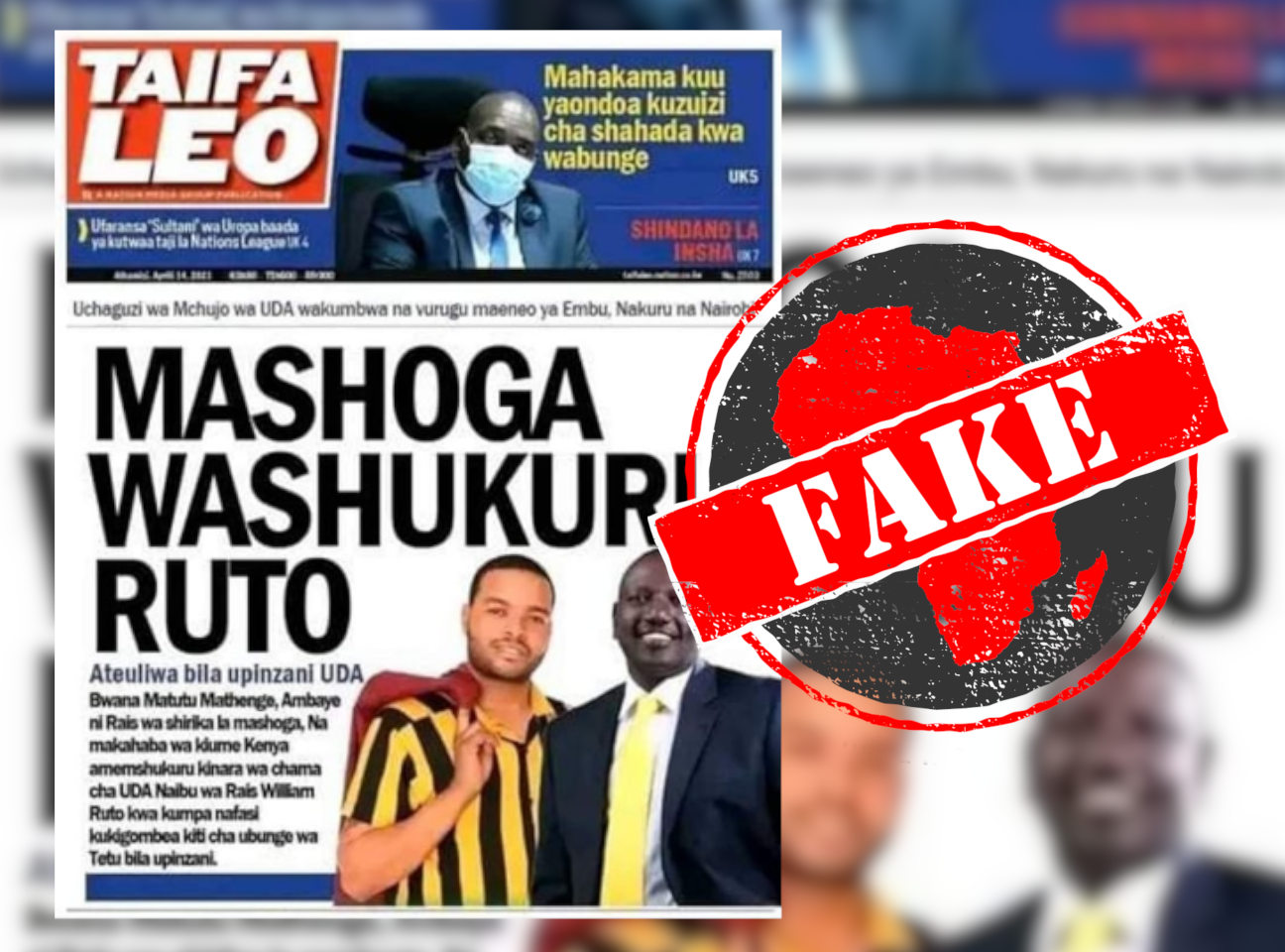IN SHORT: A newspaper's front page being circulated online claims that the gay community in Kenya is grateful to the country's president, elected August 2022. This is inaccurate.
“Mashoga Washukuru Ruto” reads the headline circulating on Facebook, on what appears to be the front page of Taifa Leo, a Kenyan Kiswahili-language newspaper.
“Mashoga Washukuru Ruto” loosely translates to “gays thank Ruto”.
The image is also doing the rounds on WhatsApp, the popular messaging service.
The intro of the lead story reads: “Ateuliwa bila upinzani UDA Bwana Matutu Mathenge, ambaye ni Rais wa shirika la mashoga, Na makahaba wa kiume Kenya amemshukuru kinara wa chama cha UDA Naibu wa Rais Willam Ruto kwa kumpa nafasi kukigombea kiti cha ubunge wa Tetu bila upinzani.”
This roughly translates from Kiswahili as: “Appointed without opposition in the UDA, politician Matutu Mathenge, the president of the organisation of gays and male prostitutes in Kenya, has thanked UDA party leader, deputy president Willam Ruto, for giving him the opportunity to run for the Tetu parliamentary seat without opposition.”
The front page shows a photo of Kenya’s president and United Democratic Alliance (UDA) party leader William Ruto – previously the country’s deputy president – and politician Matutu Mathenge.
Mathenge was an early UDA parliamentary candidate for Tetu constituency in central Kenya in the August 2022 general elections. He dropped out before the elections were held.
The publication date on the front page is “Alhamisi Aprili 14 2021”, meaning Thursday 14 April 2021.
But the front page began circulating online after Kenya's Supreme Court ruled on 24 February 2023 that the LGBTQ community in Kenya has the right to associate, or form lobbying groups, overturning a petition that tried to ban this. Members of the community can therefore register non-governmental organisations.
LGBTQ stands for lesbian, gay, bisexual, transgender, and queer.
The court's decision has been widely criticised in the country, where homosexuality is criminalised under colonial-era laws and many still hold homophobic views.
Ruto was one of those who opposed the court ruling.
The front page has also been shared on Facebook here, here, here, here and here on Facebook.
But did the gay community in Kenya “thank” Ruto? We checked.

Front page fake
Taifa Leo posts its daily front page on its official Facebook and Twitter accounts.
Africa Check searched the newspaper's Facebook page for the front page of the 14 April 2021 edition and found it – and it's completely different.
The headline reads “Anachezwa Tena?” or “Played again?”
On 1 March 2023, Taifa Leo posted the altered front page on Facebook and Twitter, stamped “FEKI”, or “fake”.
The publication said: “TAHADHARI: Usihadaike na kichwa feki cha gazeti ambacho kinaenezwa mtandaoni.”
This translates as: “CAUTION: Do not be fooled by the fake newspaper headline that is being circulated online.”
The front page has been doctored, and there’s no evidence gay people in Kenya have thanked Ruto after the country’s supreme court ruled in their favour.
Republish our content for free
For publishers: what to do if your post is rated false
A fact-checker has rated your Facebook or Instagram post as “false”, “altered”, “partly false” or “missing context”. This could have serious consequences. What do you do?
Click on our guide for the steps you should follow.
Publishers guideAfrica Check teams up with Facebook
Africa Check is a partner in Meta's third-party fact-checking programme to help stop the spread of false information on social media.
The content we rate as “false” will be downgraded on Facebook and Instagram. This means fewer people will see it.
You can also help identify false information on Facebook. This guide explains how.




Add new comment